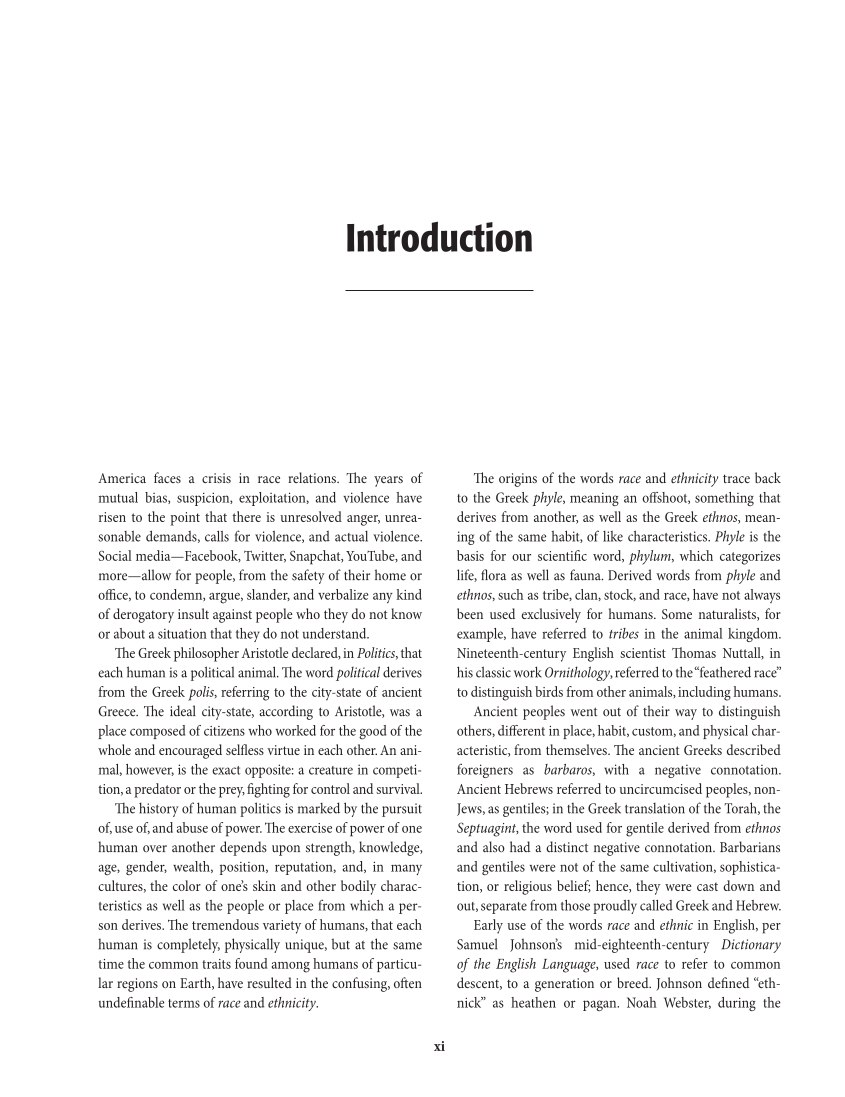xi Introduction America faces a crisis in race relations. The years of mutual bias, suspicion, exploitation, and violence have risen to the point that there is unresolved anger, unrea- sonable demands, calls for violence, and actual violence. Social media—Facebook, Twitter, Snapchat, YouTube, and more—allow for people, from the safety of their home or office, to condemn, argue, slander, and verbalize any kind of derogatory insult against people who they do not know or about a situation that they do not understand. The Greek philosopher Aristotle declared, in Politics, that each human is a political animal. The word political derives from the Greek polis, referring to the city-state of ancient Greece. The ideal city-state, according to Aristotle, was a place composed of citizens who worked for the good of the whole and encouraged selfless virtue in each other. An ani- mal, however, is the exact opposite: a creature in competi- tion, a predator or the prey, fighting for control and survival. The history of human politics is marked by the pursuit of, use of, and abuse of power. The exercise of power of one human over another depends upon strength, knowledge, age, gender, wealth, position, reputation, and, in many cultures, the color of one’s skin and other bodily charac- teristics as well as the people or place from which a per- son derives. The tremendous variety of humans, that each human is completely, physically unique, but at the same time the common traits found among humans of particu- lar regions on Earth, have resulted in the confusing, often undefinable terms of race and ethnicity. The origins of the words race and ethnicity trace back to the Greek phyle, meaning an offshoot, something that derives from another, as well as the Greek ethnos, mean- ing of the same habit, of like characteristics. Phyle is the basis for our scientific word, phylum, which categorizes life, flora as well as fauna. Derived words from phyle and ethnos, such as tribe, clan, stock, and race, have not always been used exclusively for humans. Some naturalists, for example, have referred to tribes in the animal kingdom. Nineteenth-century English scientist Thomas Nuttall, in his classic work Ornithology, referred to the “feathered race” to distinguish birds from other animals, including humans. Ancient peoples went out of their way to distinguish others, different in place, habit, custom, and physical char- acteristic, from themselves. The ancient Greeks described foreigners as barbaros, with a negative connotation. Ancient Hebrews referred to uncircumcised peoples, non- Jews, as gentiles in the Greek translation of the Torah, the Septuagint, the word used for gentile derived from ethnos and also had a distinct negative connotation. Barbarians and gentiles were not of the same cultivation, sophistica- tion, or religious belief hence, they were cast down and out, separate from those proudly called Greek and Hebrew. Early use of the words race and ethnic in English, per Samuel Johnson’s mid-eighteenth-century Dictionary of the English Language, used race to refer to common descent, to a generation or breed. Johnson defined “eth- nick” as heathen or pagan. Noah Webster, during the
Document Details My Account Print multiple pages
Print
You have printed 0 times in the last 24 hours.
Your print count will reset on at .
You may print 0 more time(s) before then.
You may print a maximum of 0 pages at a time.































































































































































































































































































































































































































































































































































































































































































































































































































































































































































































































































































































































































































































































































































































































































































































